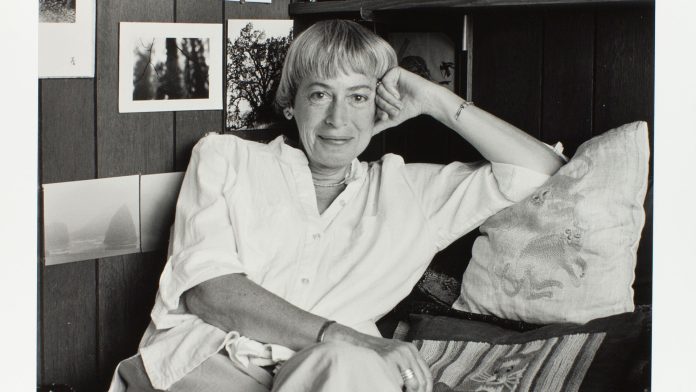(THIS ARTICLE IS MACHINE TRANSLATED by Google from Norwegian)
Arwen Curry's award-winning Worlds of Ursula K. Le Guin has been shown this summer PBS, in the fall at the café cinema Vester Vov Vov in Copenhagen, and in November it was possible to see the documentary at the IDFA festival in Amsterdam. It will be shown in Berlin, Bilbao and Amsterdam in December.

Many of Le Guin's (1929 – 2018) books have been placed in fantasy and science fiction, and she was one of America's foremost writers. Like Jules Verne, she described worlds to come, but not robots or machines, but about everyday magic, magic that is built into language and our interactions. Just as Verne predicted trips to the moon and other technological advancements, Le Guin – who was an outspoken anarchist and freedom activist – foresaw the disasters of the West: xenophobia, ecological devastation – and she predicted the fall of capitalism. Born in 1929, she experienced the best and worst of US history. Her books always took the party of the oppressed, she gave a voice to transsexuals, to lonely teens, to blacks, to the urinals.
Gothenburg 1989
She was the daughter of two important anthropologists, Alfred and Theodora Kroeber, and followed them in their field work among the barren landscapes of California, which was sacred to many indigenous Americans, and to Peru and Mexico. Alfred Kroeber researched, among other things, Ishi, the last member of the yahi tribe, who had been decimated by genocide and diseases that were transmitted through contact with the colonists. Through Ishi, Kroeber learned a great deal about Native Americans, their habits, and their tales.
In 1989 I met Ursula K. The Guin in Gothenburg, and we talked about The Dispossessed (1974), which came to affect many of my generation. It was read like a new one On the Road and became as important as Kerouac's novel. In the same way as
beat generation perceived the possibility of driving on long freeways was a metaphor for freedom and self-seeking, became The Dispossessed a new boundary to go beyond.
The novel received both the Hugo and the Nebula Prize – the two biggest awards for a science-fiction book. It is about two parallel planets: Earth-like Urras are rich in resources and suffer a permanent cold war between a capitalist and a socialist system. On the other hand, Anarres, where the protagonist Shevek lives, is a poor planet where everyone shares everything and there is no formal government or board.
Through his books, Le Guin wanted to shed light on the deep philosophical roots of anarchism.
I asked Le Guin at that time if the native Ishi was a role model for Shevek, and got the answer: "Of course! Ishi showed us another way of living. They had nothing private – everything was shared by everyone, and no one accumulated anything. If you didn't want to share something, you couldn't use it either. ”
Shevek, who is visiting the planet Urras – from where his ancestors emigrated to establish a utopi at Anarres – is amazing. Concepts like ownership, crime and theft are unfamiliar to him.
The roots of anarchism
Through her books, Ursula K. Le Guin wanted to shed light on the deep philosophical roots of anarchism. As she herself said during our conversation: «I don't think so anarchism and chaos are related to each other. Many detractors of anarchism say that no society in the world has been ruled by anarchists. But I usually mention the Paris municipality, the Spanish civil war or the Basque autonomous regions. They were controlled locally and lacked central controls. ”

I The Dispossessed says Shevek: "You can't buy the revolution. You can't do the revolution. If it's not with you, in your soul, it doesn't exist. "Le Guin emphasized:" Don't say that Shevek is my hero. I don't write about heroes; I write about dreamers, about utopians, about people who dream about other worlds. I have been classified as a science-fiction writer, but I have never liked that designation. I write about the uprising, about searching beyond the given framework. Ishi taught my father to think in other paths – like Claude Lévi-Strauss – to go back to 'the wild thinking' that we have lost. ”
Worlds to come
Le Guins The Left Hand of Darkness (1969) as well The Earthsea Cycle # 1–3 (1968–2001) are important books; you can not see Harry Potter without them. Ursula K. Le Guin created new forms of writing fantasy. She questions nations and gender – what is it to be a woman or to be a man? On alien planets or in other worlds no rules are given; you can be a politician, a utopian, an atheist. You are free from our worldview – free from our ideological burden.


